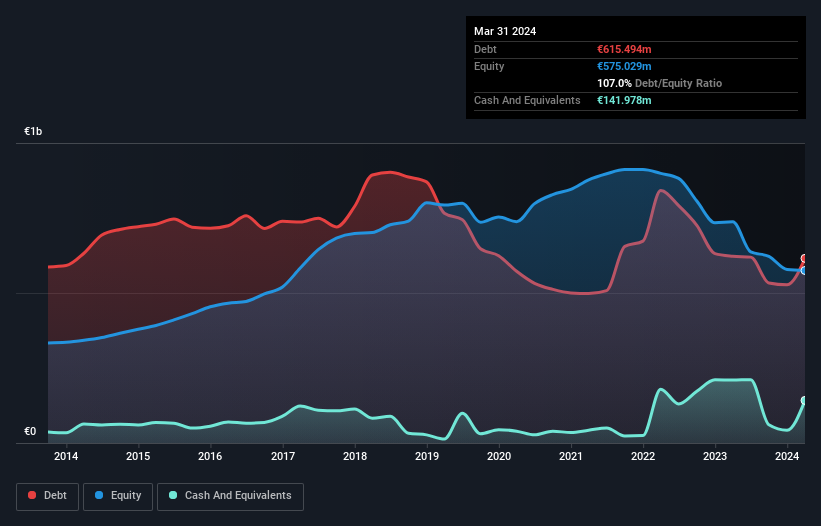- Israel
- /
- Real Estate
- /
- TASE:BCNV-M
Brack Capital Properties (TLV:BCNV-M) Has Debt But No Earnings; Should You Worry?
The external fund manager backed by Berkshire Hathaway's Charlie Munger, Li Lu, makes no bones about it when he says 'The biggest investment risk is not the volatility of prices, but whether you will suffer a permanent loss of capital.' So it might be obvious that you need to consider debt, when you think about how risky any given stock is, because too much debt can sink a company. As with many other companies Brack Capital Properties N.V (TLV:BCNV-M) makes use of debt. But is this debt a concern to shareholders?
Why Does Debt Bring Risk?
Debt is a tool to help businesses grow, but if a business is incapable of paying off its lenders, then it exists at their mercy. Part and parcel of capitalism is the process of 'creative destruction' where failed businesses are mercilessly liquidated by their bankers. However, a more usual (but still expensive) situation is where a company must dilute shareholders at a cheap share price simply to get debt under control. Of course, plenty of companies use debt to fund growth, without any negative consequences. The first thing to do when considering how much debt a business uses is to look at its cash and debt together.
Check out our latest analysis for Brack Capital Properties
How Much Debt Does Brack Capital Properties Carry?
As you can see below, Brack Capital Properties had €615.5m of debt, at March 2024, which is about the same as the year before. You can click the chart for greater detail. However, it also had €142.0m in cash, and so its net debt is €473.5m.

How Strong Is Brack Capital Properties' Balance Sheet?
According to the last reported balance sheet, Brack Capital Properties had liabilities of €186.2m due within 12 months, and liabilities of €551.8m due beyond 12 months. Offsetting these obligations, it had cash of €142.0m as well as receivables valued at €2.02m due within 12 months. So it has liabilities totalling €594.0m more than its cash and near-term receivables, combined.
When you consider that this deficiency exceeds the company's €552.6m market capitalization, you might well be inclined to review the balance sheet intently. In the scenario where the company had to clean up its balance sheet quickly, it seems likely shareholders would suffer extensive dilution. There's no doubt that we learn most about debt from the balance sheet. But you can't view debt in total isolation; since Brack Capital Properties will need earnings to service that debt. So when considering debt, it's definitely worth looking at the earnings trend. Click here for an interactive snapshot.
In the last year Brack Capital Properties had a loss before interest and tax, and actually shrunk its revenue by 11%, to €74m. That's not what we would hope to see.
Caveat Emptor
Not only did Brack Capital Properties's revenue slip over the last twelve months, but it also produced negative earnings before interest and tax (EBIT). To be specific the EBIT loss came in at €34m. When we look at that alongside the significant liabilities, we're not particularly confident about the company. It would need to improve its operations quickly for us to be interested in it. For example, we would not want to see a repeat of last year's loss of €150m. And until that time we think this is a risky stock. The balance sheet is clearly the area to focus on when you are analysing debt. But ultimately, every company can contain risks that exist outside of the balance sheet. Be aware that Brack Capital Properties is showing 2 warning signs in our investment analysis , you should know about...
When all is said and done, sometimes its easier to focus on companies that don't even need debt. Readers can access a list of growth stocks with zero net debt 100% free, right now.
Valuation is complex, but we're here to simplify it.
Discover if Brack Capital Properties might be undervalued or overvalued with our detailed analysis, featuring fair value estimates, potential risks, dividends, insider trades, and its financial condition.
Access Free AnalysisHave feedback on this article? Concerned about the content? Get in touch with us directly. Alternatively, email editorial-team (at) simplywallst.com.
This article by Simply Wall St is general in nature. We provide commentary based on historical data and analyst forecasts only using an unbiased methodology and our articles are not intended to be financial advice. It does not constitute a recommendation to buy or sell any stock, and does not take account of your objectives, or your financial situation. We aim to bring you long-term focused analysis driven by fundamental data. Note that our analysis may not factor in the latest price-sensitive company announcements or qualitative material. Simply Wall St has no position in any stocks mentioned.
Have feedback on this article? Concerned about the content? Get in touch with us directly. Alternatively, email editorial-team@simplywallst.com
About TASE:BCNV-M
Brack Capital Properties
A real estate company, owns and develops residential and commercial properties in Germany.
Low and slightly overvalued.
Market Insights
Community Narratives




